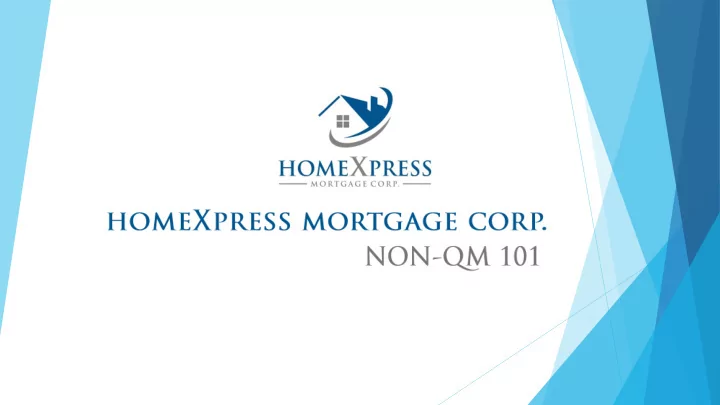

Subprime 2006 Non-QM 2018 No down payment required (80/20) or 100% Minimum 10% down payment sourced and LTV seasoned. Gift funds accepted Average 580 credit score Average 680 credit score Income – stated Full Doc, Alt Doc, DSCR No reserves Reserves required on some products Negative Amortization and balloon payments No negative amortization or balloon payment No appraisal requirements Appraisal independence requirements (AIR) Prepayment penalties No prepayment penalties except for business purpose loans Exceptions rampant- layered exceptions the norm No Exceptions to guidelines Conditions were light and most sent prior to Conditions are heavy and must be satisfied close in dry states prior to Doc in dry states
Qualified Mortgages Non-QM General QMs Points & Fees ≤ 3% of the loan amount Points & Fees ≤ 5% Max Loan Term 30 years Loan Term may exceed 30 Years No risky features (neg-am, int-only, balloon) Loan may feature Interest-Only Payments DTI ≤ 43% DTI ratio may exceed 43% GSE QMs CFPB allows origination of Non-QM loans as long as a reasonable, good-faith determination that the Any loan eligible for purchase by: consumer is able to repay the loan is based on common underwriting factors. Fannie Mae We satisfy CFPB requirements by relying on sound, Freddie Mac tested underwriting guidelines we’ve used in the past to make loans that have generally performed Agency QMs well, and we document the information we consider. Any loan eligible for guarantee or insurance by: VA FHA USDA
The ATR rule requires that we make a reasonable, good-faith determination before or when we consummate a mortgage loan that the consumer has a reasonable ability to repay the loan, considering such factors as the consumer’s income or assets and employment status Eight ATR underwriting factors: 1. Current or reasonably expected income or assets 2. Current employment status 3. Monthly mortgage payment for this loan. You calculate this using the introductory or fully-indexed rate, whichever is higher 4. Monthly payment on any simultaneous loans secured by the same property 5. Monthly payments for property taxes and insurance that you require the consumer to buy, and certain other costs related to the property 6. Debts, alimony, and child support obligations 7. Monthly debt-to-income ratio or residual income 8. Credit history
2014: A fraction of the overall loan production 2017: $15 Billion (estimated) 2018: S&P predicts $30-45 Billion Factors contributing to increase in Non-QM Rising interest rates – less conventional rate & term business Confidence in Non-QM performance continues to grow – low delinquencies Non-QM continues to evolve and become more liquid – more investors entering the market Awareness – brokers and borrowers alike are more aware that programs are available to fit their needs
Self-employed borrowers that have a lot of write-offs on their tax returns Borrowers with assets that do not show much monthly income Borrowers that have multiple rental properties with large write-offs on Schedule E Borrowers with recent or past credit issues Investors: Business purpose loans Loan based on debt service coverage ratio (DSCR) 100% of rents used Unique circumstances
Realtors Bank MLOs (turndowns) Accountants/Financial Planners Attorney’s: Tax and Bankruptcy Social Media
Steve Cutter, Vice President of Sales and Marketing scutter@homexmortgage.com Follow us on Facebook and LinkedIn for company updates!
Recommend
More recommend